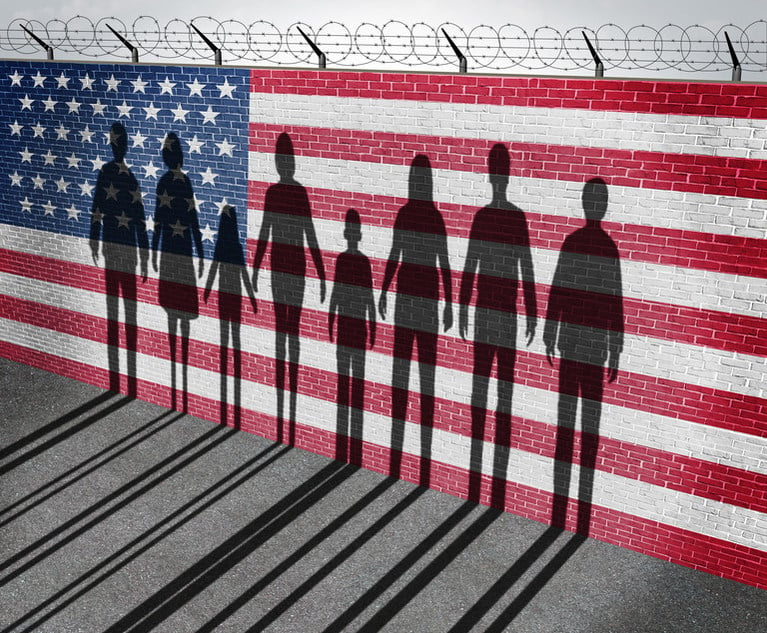U.S. FCPA Enforcement Receives International Praise
Anti-corruption efforts are applauded, but Chamber of Commerce wants more judicial review.
January 31, 2011 at 07:00 PM
6 minute read
It's safe to say that the intense effort to tackle foreign bribery has been the single most striking corporate criminal enforcement trend over the past several years. The numbers from the Justice Department's fraud section, which prosecutes Foreign Corrupt Practices Act (FCPA) cases, tell an unmistakable story.
In 2004, the Department of Justice (DOJ) booked just two FCPA cases, netting a total of $11.3 million in criminal penalties. It's been a steep climb ever since.
“In '05, which was considered the banner year at that time, the FCPA folks prosecuted five individuals and collected something like $16 million,” says Markus Funk, a partner at Perkins Coie. “And then you contrast that with 2010, where if you look at the top eight cases alone, they collected more than $1.5 billion–that's with a B.”
Such dramatic increases are often met with criticism, particularly when they cross international borders, but this is one area where the world seems to be squarely behind the hardline U.S. stance. In October 2010, the Organization for Economic Cooperation and Development (OECD) issued a glowing assessment on the state of U.S. anti-corruption enforcement.
“The OECD report is more than just a positive assessment of what the DOJ is doing currently–it's a recognition overseas that anti-corruption enforcement is the way to go,” says Mark Brzezinski, who leads the international law practice at McGuireWoods. “The fact that a multilateral institution gives such high praise to U.S. enforcement efforts is a reflection of a positive trend toward legal reform overseas.”
World Leader
With 33 member states, including most of Europe, all of North America, Japan, Korea, Australia and New Zealand, the OECD represents a large portion of the industrialized world. That's a meaningful consensus falling in behind U.S. corruption policy.
“The U.S. obviously is the world leader in this department,” says Funk. “The U.S. historically has been responsible for 70 percent of the world's foreign anti-bribery prosecution, second place being the U.K. with a little bit over 4 percent. So the U.S. is a world leader–it's the poster child for robust foreign anti-corruption enforcement efforts.”
The OECD report lauded many aspects of the U.S. FCPA push, including the effectiveness of deferred-prosecution agreements (DPAs) and nonprosecution agreements (NPAs); strong federal sentencing guidelines and stiff civil and criminal fines; and the volume of DOJ, SEC and FBI resources the government has dedicated to FCPA enforcement.
The focus on corruption, which began under the Bush administration and has intensified under President Obama, is a truly nonpartisan effort. Both sides of the aisle have clearly recognized that global market integrity is an essential component of U.S. business performance and that corruption plays a key role in core national security concerns, such as terrorism and trafficking.
Although the preponderance of comments were positive, the report does suggest several areas where U.S. corruption policy has room for improvement. Much of the DOJ and SEC public relations on the topic have focused on settlement figures and guilty pleas by individuals. The OECD would like to see more elaboration on the specific behaviors in question, and more clear guidance on what U.S. authorities see as appropriate compliance efforts.
That echoes a sentiment frequently voiced by the domestic private sector that the U.S. government has a critical role to play in giving guidance to companies on how to structure and implement internal policies and procedures on murky areas such as permissible travel and entertainment expenses. In fact, some criticism in this area has been rather pointed.
Judge and Jury
At the same time the OECD issued its FCPA report, the U.S. Chamber of Commerce presented a more critical counterpoint. In a report titled “Restoring Balance: Proposed Amendments to the FCPA,” the Chamber called for greater judicial review in corruption cases.
Because almost all FCPA cases result in NPAs and DPAs, judges very rarely get the opportunity to have a say on whether the tactics prosecutors and investigators use are appropriate. The language of the FCPA is somewhat broad, and, in an intensified enforcement climate, the consequences of any statutory vagueness are amplified.
“The Chamber of Commerce makes some fairly nuanced arguments, but you can boil down their position to the concept that the DOJ and SEC have become the judges as well as the prosecutors,” Funk says. “They do almost all of their work through nonprosecution agreements, which are not reviewed by any court. So what you have is a system, unlike any other crime you can think of, where the judges really don't get involved that much.”
In almost every FCPA case the charges are announced on the same day as the settlement and plea agreements, with the sentencing just a week or two behind. Given the increasing fines and disgorgements involved these days, that streamlined system gives companies some cause for concern.
“In almost every other kind of case you have very extensive briefing, arguments about statutory language, motions to dismiss the indictment on a variety of bases, due process claims and so forth,” Funk says. “Justices have to weigh in, and the courts give their take on whether the government's reading of the statute is accurate or overly expansive, whether the statutes are void for vagueness or what have you.”
Defendant Pushback
FCPA enforcement complaints, particularly those on the lack of compliance guidance, are apparently not falling on deaf ears.
“The DOJ has recently indicated that they want to engage in a consultative process with the private sector,” Brzezinski says. “Justice Department officials have said that they are looking closely at proposals and suggestions about fairness in the application of the law here, so I'm getting the sense that they are willing to listen.”
As for the judicial review issue, experts expect that as FCPA enforcement expands, more defendants–particularly individuals–will opt to go to trial
rather than agree to the Justice Department's terms.
“You see the most intensive pushback at the moment linked to the increased emphasis on charging individuals,” Brzezinski says. “Nothing motivates resources like being held personally responsible. When people are charged, as opposed to companies being charged, they are more willing to go to trial.”
Given that the surge in corruption enforcement is a relatively recent development, an uptick in trials may be the next logical phase of the trend.
“I would be surprised if you do not find more trials,” Funk says. “Defendants are not just going to roll over and plead guilty or work out a deal. I expect there will be more challenges to the DOJ's interpretation of the statute.”
This content has been archived. It is available through our partners, LexisNexis® and Bloomberg Law.
To view this content, please continue to their sites.
Not a Lexis Subscriber?
Subscribe Now
Not a Bloomberg Law Subscriber?
Subscribe Now
NOT FOR REPRINT
© 2024 ALM Global, LLC, All Rights Reserved. Request academic re-use from www.copyright.com. All other uses, submit a request to [email protected]. For more information visit Asset & Logo Licensing.
You Might Like
View All
'The Show Must Go On': Solo-GC-of-Year Kevin Colby Pulls Off Perpetual Juggling Act

Immigration Under the Trump Administration: Five Things to Expect in the First 90 Days
8 minute read
Dog Gone It, Target: Provider of Retailer's Mascot Dog Sues Over Contract Cancellation
4 minute read
Lululemon Faces Legal Fire Over Its DEI Program After Bias Complaints Surface
3 minute readTrending Stories
- 1'The Show Must Go On': Solo-GC-of-Year Kevin Colby Pulls Off Perpetual Juggling Act
- 2Legal Speak at General Counsel Conference East 2024: Match Group's Katie Dugan & Herrick's Carol Goodman
- 3Legal Speak at General Counsel Conference East 2024: Eric Wall, Executive VP, Syllo
- 4Battle for Top Talent Accelerates Amid Profit and Demand Surge
- 5Friday Newspaper
Who Got The Work
Michael G. Bongiorno, Andrew Scott Dulberg and Elizabeth E. Driscoll from Wilmer Cutler Pickering Hale and Dorr have stepped in to represent Symbotic Inc., an A.I.-enabled technology platform that focuses on increasing supply chain efficiency, and other defendants in a pending shareholder derivative lawsuit. The case, filed Oct. 2 in Massachusetts District Court by the Brown Law Firm on behalf of Stephen Austen, accuses certain officers and directors of misleading investors in regard to Symbotic's potential for margin growth by failing to disclose that the company was not equipped to timely deploy its systems or manage expenses through project delays. The case, assigned to U.S. District Judge Nathaniel M. Gorton, is 1:24-cv-12522, Austen v. Cohen et al.
Who Got The Work
Edmund Polubinski and Marie Killmond of Davis Polk & Wardwell have entered appearances for data platform software development company MongoDB and other defendants in a pending shareholder derivative lawsuit. The action, filed Oct. 7 in New York Southern District Court by the Brown Law Firm, accuses the company's directors and/or officers of falsely expressing confidence in the company’s restructuring of its sales incentive plan and downplaying the severity of decreases in its upfront commitments. The case is 1:24-cv-07594, Roy v. Ittycheria et al.
Who Got The Work
Amy O. Bruchs and Kurt F. Ellison of Michael Best & Friedrich have entered appearances for Epic Systems Corp. in a pending employment discrimination lawsuit. The suit was filed Sept. 7 in Wisconsin Western District Court by Levine Eisberner LLC and Siri & Glimstad on behalf of a project manager who claims that he was wrongfully terminated after applying for a religious exemption to the defendant's COVID-19 vaccine mandate. The case, assigned to U.S. Magistrate Judge Anita Marie Boor, is 3:24-cv-00630, Secker, Nathan v. Epic Systems Corporation.
Who Got The Work
David X. Sullivan, Thomas J. Finn and Gregory A. Hall from McCarter & English have entered appearances for Sunrun Installation Services in a pending civil rights lawsuit. The complaint was filed Sept. 4 in Connecticut District Court by attorney Robert M. Berke on behalf of former employee George Edward Steins, who was arrested and charged with employing an unregistered home improvement salesperson. The complaint alleges that had Sunrun informed the Connecticut Department of Consumer Protection that the plaintiff's employment had ended in 2017 and that he no longer held Sunrun's home improvement contractor license, he would not have been hit with charges, which were dismissed in May 2024. The case, assigned to U.S. District Judge Jeffrey A. Meyer, is 3:24-cv-01423, Steins v. Sunrun, Inc. et al.
Who Got The Work
Greenberg Traurig shareholder Joshua L. Raskin has entered an appearance for boohoo.com UK Ltd. in a pending patent infringement lawsuit. The suit, filed Sept. 3 in Texas Eastern District Court by Rozier Hardt McDonough on behalf of Alto Dynamics, asserts five patents related to an online shopping platform. The case, assigned to U.S. District Judge Rodney Gilstrap, is 2:24-cv-00719, Alto Dynamics, LLC v. boohoo.com UK Limited.
Featured Firms
Law Offices of Gary Martin Hays & Associates, P.C.
(470) 294-1674
Law Offices of Mark E. Salomone
(857) 444-6468
Smith & Hassler
(713) 739-1250






